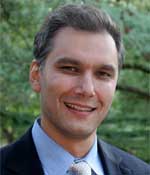Alex Demkov
Biography:
 Alex Demkov received his Ph.D. in theoretical physics in 1995 from Arizona State University (ASU). In 1995-1997 he was a postdoctoral researcher at ASU. In 1997-2005 he was a principal staff scientist in Motorola’s R&D organization providing theoretical support for the development of low- and high-k dielectric materials. In 2005 he joined the faculty of the Physics Department at the University of Texas at Austin.
Alex Demkov received his Ph.D. in theoretical physics in 1995 from Arizona State University (ASU). In 1995-1997 he was a postdoctoral researcher at ASU. In 1997-2005 he was a principal staff scientist in Motorola’s R&D organization providing theoretical support for the development of low- and high-k dielectric materials. In 2005 he joined the faculty of the Physics Department at the University of Texas at Austin.
Prof. Demkov has published over 80 research papers and has been awarded seven U.S. patents. He co-authored the 2005 edition of the Semiconductor Roadmap (ITRS). In 2002-2004 he served as Associate Editor of the Journal of Vacuum Science and Technology B. He served as guest Editor for several issues of physica status solidi (b). He contributed to several books and edited a book entitled “Materials fundamentals of gate dielectrics.” He organized numerous sessions and served on program committees of many national and international conferences. For many years he coordinated FIAP focused sessions at the March Meeting. He received the NSF CAREER award, and is a Fellow of the American Physical Society.
Statement:
I am a condensed matter theorist working on computational materials physics problems. Before joining the University of Texas I worked on materials for transistor technology in Motorola’s R&D Labs. The health and future of our enterprise critically depends on our ability to attract bright graduate students to Applied Research. In my experience, interest in applied physics among students is still high. However, exposure to it is rather limited. This is partly due to the relative isolation of industrial researchers working in smaller companies from the academic establishment. FIAP has done a good job in bringing these groups together, and we can and should do more.
If elected as a member-at-large of FIAP, I will seek to bring focus and attention to physics graduate students interested in applied science. With colleagues I have helped to introduce the FIAP travel grants for students to come to the March Meeting. We can introduce the best FIAP student paper and recognize it with a plaque and small monetary award beyond the travel grant. We also can be more active in helping students find industrial employment by providing a directory of graduating FIAP members. Paraphrasing Pericles, what we should lament is not the loss of the facilities but the loss of researchers. Researchers come first; the rest is the fruit of their labor.
